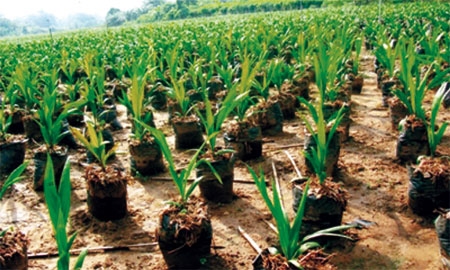The Cameroon Development Corporation (CDC) is a parastatal agro-industrial company operating in Cameroon which aims to improve the agricultural sector by growing, processing, and marketing tropical export crops.
Its major products include bananas marketed in partnership with Del Monte, semi-finished rubber, cholesterol-free red palm oil, and palm kernel which is sold locally for the manufacture of soap and cosmetics. CDC has plantations spread across over 40,000 hectares of land, and is the second largest employer in Cameroon with over 15,700 employees, including seasonal workers.
CDC continues to contribute to the social economic growth of the country by channelling efforts into agriculture, Cameroon’s main industry and source of livelihood. “The CDC family is like any small family in Cameroon multiplied a number of times,” says Henry Njalla Quan, General Manager of CDC. “They must ensure the family is healthy and fed. Our workers have the minimum they need to survive. They are paid regularly, have medical care, are protected, can educate their children and participate in shaping the future of the country.”
Cameroon is not only an ideal location for growing a range of crops and developing agriculture, but the CDC also possesses many competitive advantages that make the corporation unique. The future for CDC lies in sustainability. “I am trying to set in motion a system that can sustain the corporation for the next 30 or 40 years,” says Mr Quan. “Sustainability is very important. I want CDC to be the corporation that people fight to work for. I want our workers to be able to grow within the company. We send staff out for training, and keep them learning.”
So growth and learning go hand in hand for both CDC in particular and the agriculture sector in general. The corporation is engaged in joint efforts between many branches of Cameroonian business and society, so that the nation can learn how to better support agriculture – still a lifeline for the majority of Cameroonians. “I believe that learning is a process, and ends when life ends,” says Mr. Quan. “The world is changing every day, so we must keep up with times, and manage change.”
According to CDC’s CEO Henry Quan...
The Ministry of Finance says agriculture is Cameroon’s number one priority. How exactly do you plan to develop the sector, and what obstacles to you face?
In my opinion we need to take a close look at the agricultural map of the country, the possibilities, and hook it up with other stakeholders. For example not all land can be dedicated to agriculture. There are other industries and some use up a lot of land, for example aviation and the construction of airports uses much land, as do roads, railways and also the unstoppable population growth. There is also the movement of the deserts southwards. There is an active volcano which can cause a lot of destruction. A lot of factors must be considered in order to come up with an adequate plan.
It is important that all these elements are put together for a good development plan. Here we are looking at CDC 25 years from now, at Vision 2035. We usually work on a five-year plan, but switched over to this 25-year plan. We have a plan, which in principal would maybe double, or triple present production and create at least 10,000 more jobs in the next five to ten years.
What are the institution’s main activities?
I think it was created to tend to the needs of the people at that time, and it has always done so. When I was growing up, Victoria was an agricultural town. CDC operated the ports and had its own network of hospitals, health centres, and schools. It was the main breadwinner for Cameroonians. It is still playing that role, but fortunately some of the activities not directly linked to agriculture have been taken over by the government. We do however employ teachers and put them in schools, and extend our medical facilities to villages. We also work in the fight against AIDS and malaria. We have a social welfare department.
Can you tell us about some specific projects such as the oil extension project?
It started in November last year. The regions down south have the best conditions for palm oil culture. We are trying to organise it so that we can move the palm oil industry into more lucrative areas, and enable some plantations to produce a more lucrative crop. We are designing the plantations taking into consideration the realities of today, and the dreams of tomorrow.

2 COMMENTS
GREAT CDC
can you explain to the oroko ple who good cdc has been to them and whats thier future in cdc, like sonara also. To the best of my knowladge l have not yet notice any thing, may be you have something coming, let us know.